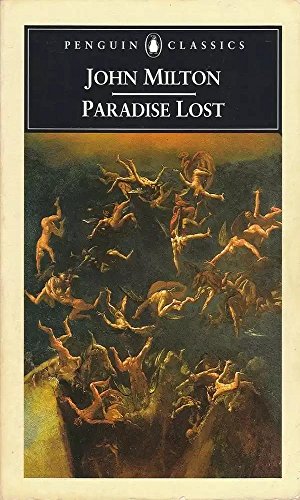Paradise Lost Summary
6 min read ⌚
 About two centuries ago, it would have been strange if you considered Shakespeare a better writer than Milton and if you didn’t think of “Paradise Lost” as the greatest book ever written – in the English or any language.
About two centuries ago, it would have been strange if you considered Shakespeare a better writer than Milton and if you didn’t think of “Paradise Lost” as the greatest book ever written – in the English or any language.
Read our summary and find out why.
Who Should Read “Paradise Lost”? And Why?
Even if you haven’t read your “Bible,” you know the story.
It’s right there in Genesis 1-3!
Now, “Paradise Lost” is Milton spending about 400 pages and 10,000 verses to retell the very same story in much more previously non-existent detail and in a language, which looks much more like Latin than English.
So why should you care?
Well, because it is powerful, astonishing, magnificent, memorable. Because it is one of the major works in the English language and, because, as you’ll soon learn, some of the things you know about the Fall of Man you actually know from here, and not from the “Bible.”
Bearing in mind the fact that the latter was supposedly written by God himself, it is difficult not to think of Milton as sitting on Jehovah’s table right now, drinking a cup of tea with the Almighty God and saying something along the lines of:
“Well, you see, Big J, you may have been a good, imaginative writer – but I was better…”
Of course, in a much humbler – and yet more eloquent – manner.
John Milton Biography
John Milton was an English poet and man of letters, commonly considered “one of the preeminent writers in the English language.”
was an English poet and man of letters, commonly considered “one of the preeminent writers in the English language.”
One of the most knowledgeable man of his times, he was fluent in English, Latin, Greek, and Italian – writing his works in all of these languages – and knew French, German, Spanish, Hebrew, Aramaic, Syriac as well.
Written in 1644, his “Areopagitica” is one of the most famous celebrations and apologies of freedom of speech, and even today, his “Paradise Lost” is widely considered the best epic poem in the English language.
A civil servant for the Commonwealth of England, Milton was a life-long Republican and all but a chauvinist – something which hasn’t gone well with many of his critics.
Plot
Just like the “Iliad” and “The Odyssey,” “Paradise Lost” begins with something smart literary critics like to call an invocation, and what we refer to as either “spoiler alert” or “so all it takes to be a good poet is to know a muse or two”:
Of Man’s first disobedience, and the fruit
Of that forbidden tree whose mortal taste
Brought death into the world, and all our woe,
With loss of Eden, till one greater Man
Restore us, and regain the blissful Seat,
Sing Heav’nly Muse…
Now, Milton, could have said this in a much more straightforward manner, but, being one of the smartest guys in his – or any other – age, he chose to flaunt his skills a bit and say it in a way which makes us think that we would be able to better understand Homer’s invocations in his original Greek!
And that Milton would have had trouble with scoring high on his SAT essay! Because, come on, John – did you not know that the verb shouldn’t be in the sixth line!
Needless to add – our poet goes on the same way for about ten thousand more verses, which makes reading “Paradise Lost” a seriously time-demanding endeavor.
(And no, you’ll not be able to read it in 6 hours and 14 minutes!)
However – it’s also pretty rewarding, because you can’t think of a story on a much larger scale than the one told in this epic.
It begins in Hell, where Satan – formerly called Lucifer – has just fallen from Heaven and is about to rally all of his buddies.
And his buddies are none other but fallen angels who had rebelled against God and lost after three days of apocalyptic fighting and once the Son of God (Jesus Christ before he became him) decided to show up.
You know – the usual suspects: Mammon, Beelzebub, Belial, Moloch… and other demons which have invaded your childhood nightmares.
Now, Satan is not really interested in giving up, so in Pandemonium (the capital city of Hell – because even Hell has to have one), he employs his excellent rhetorical skills to convince his army that there’s another fight to be won.
And when we say “excellent rhetorical skills” we mean that sometimes he’s so inspirational and mellow-tongued that people have wondered who Milton is actually rooting for.
How does this sound for a speech:
Here at least
we shall be free; the Almighty hath not built
Here for his envy, will not drive us hence:
Here we may reign secure, and in my choice
to reign is worth ambition though in Hell:
Better to reign in Hell, than serve in Heaven.
William Blake had his say on the matter: “the reason Milton wrote in fetters when he wrote of Angels & God, and at liberty when of Devils & Hell, is because he was a true Poet and of the Devil’s party without knowing it.”
Anyway, Satan’s plan is pretty simple: God’s kingdom may be out of reach, but that doesn’t mean his most beloved creation – i.e., humankind – is out of reach as well.
So, he decides to do something about it.
Off to Eden.
Adam and Eve are as happy as you’d think they are in a place called “garden of God” but they are also unaware that Satan is already in their vicinity and is about to trick them out of their happiness.
God – who, by the way, knows about Satan’s plan and, you know, everything else – sends the angel Raphael to teach Adam and Eve a thing or two about Evil incarnate… and things they’d like to know but were too afraid to ask.
He also does the more obvious thing – namely, getting Satan out of Eden.
Sometime later, however, Satan returns disguised as a serpent. And it seems that this does the trick, since the All-Knowing God can’t see through the disguise – or, at least, doesn’t want to – which gives Satan just about enough time to make Eve eat the Forbidden Fruit.
Adam – being the romantic men are usually not – says that since he and Eve are of the same body, they should also be of the same mind and has a bite himself, knowing that it is wrong.
What happens next would be at least PG-13 rated:
But that false fruit
Far other operation first displayed,
Carnal desire inflaming; he on Eve
Began to cast lascivious eyes; she him
As wantonly repaid; in lust they burn,
Till Adam thus ‘gan Eve to dalliance move…
If you don’t get it – yes, Milton is talking about Adam and Eve having lustful sex.
And – guess what? – they are not even sorry!
Paradise Lost Epilogue
But they are about to be!
Because, to begin with, they can’t sleep, burdened with nightmares and bad thoughts. And when they wake up – they have feelings they don’t really know and that we have felt numerous times: shame and regret.
Satan triumphantly returns to Hell, but God as triumphantly turns him and all the other devils into snakes.
Which makes you wonder – why didn’t he do that just few days before!
He would have saved humanity much trouble!
Speaking of which – God is done with Satan but is not done with Adam and Eve just yet. He punishes them as well, introducing into their lives things such as labor pains and death.
On the bright side, he sends archangel Michael to tell Adam and Eve what awaits humanity and how things are about to get so wicked that in few hundred years, God would have to send a Flood Gilgamesh-style to wipe away everything that is not Noah and his ark.
So yes – there is not really a bright side to this story.
Unless you consider Michael’s suggestion – as he banishes the first two humans from Eden – that Adam and Eve may find a paradise within themselves, a bright side.
We, frustrated and stressed out as we are on a daily basis, don’t.
Like this summary? We’d like to invite you to download our free 12 min app, for more amazing summaries and audiobooks.
“Paradise Lost PDF Quotes”
The mind is its own place, and in itself can make a heaven of hell, a hell of heaven. Click To Tweet Better to reign in Hell, than to serve in Heaven. Click To Tweet Solitude sometimes is best society. Click To Tweet Long is the way and hard, that out of Hell leads up to light. Click To Tweet Abashed the devil stood and felt how awful goodness is and saw Virtue in her shape how lovely: and pined his loss. Click To TweetOur Critical Review
Writing back in the 18th century, Samuel Johnson – “arguably the most distinguished man of letters in English history” and the guy who singlehandedly wrote your Dictionary – described “Paradise Lost” as “a poem which, considered with respect to design, may claim the first place, and with respect to performance the second, among the productions of the human mind.”
And bear in mind that Johnson didn’t even like Milton as a political thinker!
Yes – “Paradise Lost” is that good: it transgresses political boundaries, something even love sometimes can’t.
And you’ll live a poorer life if you never experience its majesty and beauty.
Emir is the Head of Marketing at 12min. In his spare time, he loves to meditate and play soccer.







